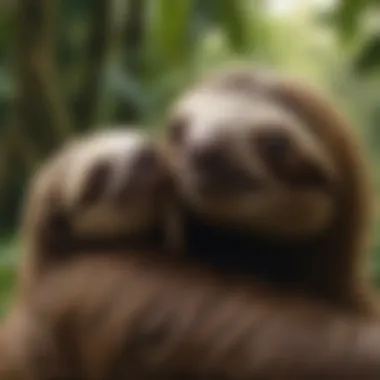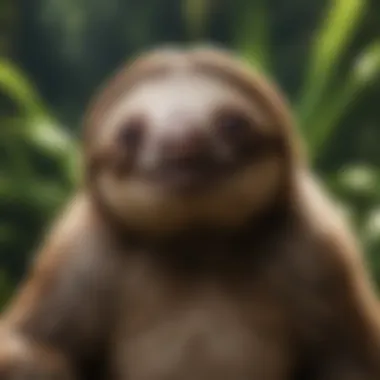Unveiling the Enigmatic Nature of Sloths: A Study on their Friendliness


Animal Species Profile
Sloths are intriguing creatures known for their leisurely pace and seemingly laid-back demeanor. These iconic animals, native to the lush rainforests of Central and South America, have captured the interest of wildlife enthusiasts worldwide. With their slow movements and distinctive appearance, sloths portray a unique charm that sets them apart from other species.
Physical Characteristics and Appearance
Sloths possess unique physical adaptations that enable them to thrive in their arboreal habitat. Their long claws aid in gripping tree branches, while their slow metabolism helps conserve energy. These creatures are well-adapted for a life spent primarily hanging upside down from tree limbs. Moreover, their coarse fur coats often host symbiotic algae, providing excellent camouflage amidst the green foliage.
Natural Habitat and Distribution
Sloths are primarily found in the tropical rainforests of Central and South America, where they reside in the canopy layer of trees. Their habitat includes regions such as the Amazon rainforest and the forests of Costa Rica. These environments offer ample food sources and shelter for sloths, allowing them to lead a predominantly arboreal lifestyle.
Behavior and Social Interactions
Contrary to popular belief, sloths are not unfriendly but rather exhibit a calm and cautious demeanor. These solitary animals lead quiet lives, typically interacting only during mating season. Sloths communicate through various sounds and body language cues, such as soft vocalizations and gentle touching. Their social interactions are minimal, with the focus on self-preservation and conserving energy for their slow-paced existence.
Preamble
When delving into the realm of sloths, one cannot help but be captivated by the enigmatic charm of these creatures. Sloths, with their unhurried pace and endearing demeanor, have long been a subject of fascination for both animal lovers and researchers alike. This article embarks on a meticulous journey to unravel one of the most intriguing aspects of sloth behavior - their friendliness. By exploring the complexities of sloth interactions, demeanor, and social dynamics, we aim to shed light on the true essence of these unique creatures.


Through a comprehensive examination of sloth behavior, this article seeks to challenge existing perceptions and provide invaluable insights into the often-misunderstood world of sloths. By weaving together research findings and firsthand accounts, we aim to paint a nuanced portrait of sloth friendliness, delving into the factors that influence their social behavior and debunking prevalent misconceptions.
At the core of this exploration lies a quest to uncover the essence of sloth friendliness. By peeling back the layers of assumptions and stereotypes surrounding these gentle creatures, we aim to offer readers a fresh perspective on the intricacies of sloth interactions and the rich tapestry of their social dynamics.
Understanding Sloths
Understanding Sloths plays a critical role in dissecting the enigmatic world of these unique creatures. Delving deeper into their behaviors, social dynamics, and ecological preferences unveils a tapestry of intricate details that define their essence. By unraveling the mysteries of Understanding Sloths, we gain profound insights into their evolutionary journey, survival strategies, and interactions with their surroundings. This section serves as a gateway to comprehending the complexities that shape sloths' demeanor and their place in the ecosystem.
Physical Characteristics of Sloths
Sloths, characterized by their slow-motion lifestyle, exhibit a plethora of fascinating physical attributes. With their shaggy fur, clawed digits, and specialized metabolism, sloths have adapted remarkably to arboreal existence. Their unique features, such as the slowest metabolic rate among mammals and specialized leaf-based diet, are essential for their survival in the dense canopy of tropical rainforests. Understanding the Physical Characteristics of Sloths provides profound insights into how these adaptations have sculpted them into the remarkable beings they are today.
Habitat and Adaptations
The Habitat and Adaptations of sloths intricately intertwine with their survival strategies in the lush realms they inhabit. Relying on a specific set of adaptations, including slow movements, greenish hue for camouflage, and symbiotic relationships with algae, sloths have crafted a harmonious existence within their forest abodes. Their choice of tropical forest canopies as primary habitats and their adeptness at conserving energy through stillness showcase a deep-seated adaptation to a life of tranquility amidst the verdant foliage. Exploring the Habitat and Adaptations of sloths unravels the symbiotic relationship they share with their environment and sheds light on their captivating journey of evolution.
Social Behavior of Sloths
The topic of Social Behavior of Sloths holds a critical position in this narrative, serving as a cornerstone in unraveling the nuances of these enigmatic creatures. By focusing on the intricacies of how sloths interact within their species and with external factors, we shed light on the essence of their existence. Understanding the manner in which sloths engage in social settings provides us with a deeper appreciation for their evolutionary journey and ecological role.
Interactions with Other Sloths


Delving into the realm of Interactions with Other Sloths unveils a tapestry of complexity and cohesiveness within the sloth community. Sloths, despite their reputation for solitariness, engage in subtle yet meaningful exchanges with their counterparts. From grooming rituals to territorial behaviors, each interaction cements the fabric of sloth society. Observing these interactions not only enriches our comprehension of sloth dynamics but also showcases the delicate balance of cooperation and independence within their community.
Relationship with Humans
When exploring the Relationship with Humans, a fascinating juxtaposition emerges between these gentle creatures and mankind. Despite existing primarily in their realm of treetops, sloths have captivated human interest and adoration. Through rescue and rehabilitation efforts, humans have forged a unique bond with sloths, emblematic of compassion and conservation. Understanding this bond illuminates not only our impact on sloth populations but also reflects our innate connection to nature and the responsibility it entails.
Perceptions vs. Reality
In this segment of the enthralling investigative multitude on the friendliness of sloths, we confront the compelling dichotomy between perceptions and reality in understanding these enigmatic creatures. Far beyond merely a juxtaposition of contrasting views, this exploration unravels the intricate web of preconceived notions that obscures the genuine essence of sloths' behaviors and social demeanor.
Perceptions, often molded by sensationalist media portrayals or limited encounters, tend to cast sloths as mere lazy, apathetic creatures devoid of complexity or emotion. Delving deeper, we unearth the subtle nuances and layers that cloak the true nature of sloths, challenging popular misconceptions and inviting a shift in perspective.
Conversely, reality paints a far richer tapestry of sloth behavior, unveiling a world teeming with subtle gestures, calculated movements, and underlying sociability. Through meticulous observation and in-depth studies, researchers have peeled back the veneer of misconception, revealing sloths' true character as intelligent, deliberate beings with intricate social dynamics.
The crux of this discourse lies in the significance of bridging the gap between perceptions and reality, shedding light on the importance of informed discourse and accurate representation in understanding these fascinating creatures. By dissecting the layers of misconception and revealing the authentic traits of sloths, we not only enrich our knowledge but also cultivate a deeper appreciation for the natural world and its diverse inhabitants.
Factors Influencing Friendliness
In this segment, delving into the intricate realm of sloths' temperament, we shed light on the crucial role of factors influencing their friendliness. By meticulously exploring the nuances surrounding these factors, we unravel a captivating narrative that unveils the mysteries behind sloths' behavior. From instinctual inclinations to external stimuli, every element plays a significant part in shaping the demeanor of these enigmatic creatures. As we dissect the interplay between various influences, a deeper understanding of sloths' friendliness emerges, offering invaluable insights to those intrigued by the captivating nature of these animals.


Instinctual Behavior
Navigating the labyrinth of sloths' instinctual behavior opens a gateway to comprehending their overall friendliness. These innate patterns, ingrained in their biological makeup through evolution, dictate a substantial portion of their social interactions and demeanor. Whether it's their leisurely pace of movement or their selective engagement with the environment, instinctual behavior forms the foundational basis of sloths' unique charm. By unraveling the complexities of these inherent tendencies, we gain a profound appreciation for the intricate mechanisms that govern sloths' conduct and, subsequently, their perceived friendliness.
Environmental Factors
Venturing into the realm of environmental factors unveils another layer of the friendliness exhibited by sloths. Their habitat, comprising lush canopies and serene settings, plays a pivotal role in shaping their social dynamics and overall amiability. From climate conditions to vegetation abundance, each environmental component intricately intertwines with sloths' behavior, sculpting a distinctive demeanor that sets them apart. By immersing ourselves in the surroundings that define sloths' existence, we gain a nuanced perspective on how external influences sculpt their friendliness, offering a holistic view of these intriguing creatures.
Misconceptions About Sloths
In delving into the realm of sloths and their intriguing behaviors, it is paramount to address the prevalent misconceptions that shroud these fascinating creatures. Misconceptions about sloths hold a crucial position in this article as they serve as a cornerstone for unraveling the true essence and nature of these enigmatic beings. By dissecting and debunking these misconceptions, we can peel back the layers of misunderstanding and paint a more accurate picture of sloths and their inherent characteristics.
One key element to consider when delving into misconceptions about sloths is the impact they have on shaping public opinion and perception. These misconceptions often stem from myths and misinformation, perpetuating false beliefs about sloths' behaviors and traits. By shedding light on these misconceptions, we not only rectify the inaccuracies but also educate and enlighten readers, fostering a deeper appreciation for the complexity of sloths as unique beings in the animal kingdom.
Furthermore, exploring misconceptions about sloths offers an opportunity to showcase the resilience and adaptability of these creatures in the face of misinterpretation. By understanding and clarifying misconceptions, we can highlight the remarkable evolutionary strategies and survival mechanisms that sloths have honed over centuries. This serves to showcase sloths in a new light, breaking free from stereotypes and misconceptions, and elevating their status as remarkable examples of nature's ingenuity.
In essence, navigating the realm of misconceptions about sloths within this article serves as a crucial stepping stone towards unraveling the layers of mystery that enshroud these intriguing creatures. By addressing and deconstructing these misconceptions, we pave the way for a more nuanced and accurate understanding of sloths, allowing readers to glimpse into the captivating world of these unique and misunderstood animals.
The End
In unraveling the friendliness of sloths, we unearth a topic brimming with intrigue and complexity. This section serves as the pinnacle of our exploration, encapsulating the essence of our findings and reflections. Understanding the friendliness of sloths is not merely a superficial pursuit but a profound dive into the intersection of nature, behavior, and perception.
By delving into the intricacies of sloth behavior, we not only unveil their personalities but also challenge ingrained assumptions about these enigmatic creatures. The importance of this conclusion lies in reshaping our perspectives and fostering a deeper appreciation for the nuanced world of sloths.
Throughout this article, we have unraveled layers of preconceived notions and shed light on the multifaceted nature of sloth friendliness. From debunking misconceptions to exploring the factors that influence their behavior, we have traversed a landscape of discovery and enlightenment.
As we draw the curtains on our exploration, it becomes evident that the friendliness of sloths is a tapestry woven with threads of instinct, environment, and social dynamics. Embracing the essence of conclusion, we not only enrich our understanding of sloths but also embark on a journey of appreciation for the subtle gestures and interactions that define these captivating creatures.







